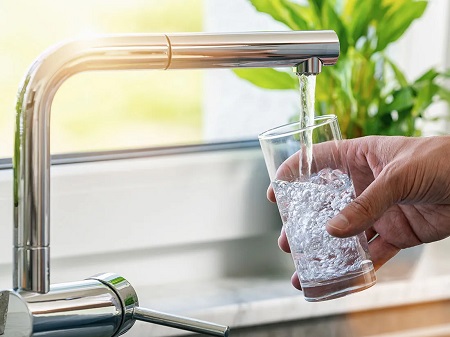ADA / CALGreen / WaterSense (contextual)
ASME A112.18.1 (contextual)
RTCA DO-160 (environmental)
How Fontana Touchless Eliminates Downtime
This technical brief summarizes the sensing architecture, environmental hardening, and power design choices that minimize in-service interruptions for touchless faucets installed in aircraft lavatories and other compact, safety-critical environments. Emphasis is on verifiable engineering details suitable for specification, shop drawings, and AEC coordination.
Context & Applicable Use Cases
Aviation lavatories introduce reflective surfaces, variable lighting, vibration, humidity cycling, pressure changes, and tight access envelopes. Specifiers therefore prioritize detection stability, sealed electronics, and predictable power behavior across 12–28 V DC systems. Fontana’s aviation pages consolidate these requirements and implementation notes:
Touchless Faucets for Airline Fleet Lavatories,
Aviation-Grade Touchless Faucets for Fleet Lavatories,
and
Compliance Notes for Airline Lavatory Fixtures.




Sensing Architecture: Time-of-Flight (TOF) for Detection Stability
Fontana specifies a TOF (Time-of-Flight) sensing module that determines user presence by measuring the travel time of emitted light rather than reflected intensity. This approach is less sensitive to specular reflections, glossy laminates, or rapid cabin light changes than conventional IR thresholding. Result: fewer false triggers in mirrored or stainless environments and dependable actuation with gloves or partial occlusion.
- Lower recalibration burden during operations since ambient lighting shifts have minimal effect.
- Reduced nuisance activation near light-colored basins or metallic surrounds.
- Consistent hand-off distances enable predictable splash envelopes in compact lavatories.
See Fontana’s aviation program summaries and integration pages for sensing, IP enclosure, and retrofit considerations:
Aviation Touchless Faucets — Market & Engineering Overview and
Integrating Touchless Faucets, Soap Dispensers, and Dryers.
Environmental Qualification & Encapsulation
Alignment with RTCA DO-160 Environmental & EMI/EMC Tests
For aviation deployments, functional robustness is tied to DO-160 methods (vibration, temperature/humidity cycling, pressure, and EMI/EMC behavior). Fontana’s aviation pages frame these requirements for fleet operators and retrofit programs, emphasizing electronics stability and avionics coexistence.
Hermetic Electronics for Corrosion and Nuisance-Trigger Mitigation
Internal control boards and sensor assemblies are resin-encapsulated to isolate against condensation, cleaning agents, and fine aerosols. The hermetic potting reduces corrosion pathways and stabilizes sensor baselines—critical where daily chemical cleaning and rapid humidity swings occur.


Power Architecture: Aviation-Grade Module (12–28 V DC)
To cope with aircraft bus fluctuations and transients, the power module auto-stabilizes input within 12–28 V DC ranges, protecting the solenoid driver and sensor electronics from fatigue. Low average current draw supports long flight cycles without maintenance. When used in ground facilities (MRO, lounges), integration with approved AC/DC converters is straightforward using Class 2 circuits and segregated low-voltage routing (see Fontana AEC guidance).
System Integration: Basin Geometry, Envelope, and Maintenance Access
Spatial Envelope & Mounting
- Compact wall-mount or deck-mount bodies for shallow cabinetry and minimized cavity depth.
- Sensor and valve integration for minimizing tubing lines and easy service access from the service panels.
- Ingress protection as per geographical requirements; IP65/IP67 in high moisture areas, as project requirements specify.
Hydraulics & Flow Management
- Typical aviation flow with a target of 0.10-0.25 gpm with instantaneous shut-off to conserve water on board
- Solenoid current response curves chosen for predictable laminar flow for distances in short range.
Controls & Multi-Device Coordination
- Star (home-run) topology for low-voltage distribution; avoid daisy-chain runs with mixed loads.
- Clear labeling of drivers and VA allocation; partition loads when exceeding common Class 2 thresholds.
Codes & Standards (Commercial / Institutional Context)
While aircraft installations follow aviation qualification (e.g., DO-160), many Fontana touchless models used in terminals, lounges, and ground facilities are selected with the following building-sector standards in mind:
- ADA (2010 ADA Standards for Accessible Design) — clear floor space, reach ranges, and operability affect faucet placement and spout projection; specifier to confirm mounting heights and knee clearance per project conditions.
- WaterSense & CALGreen — low-flow aerators and shut-off logic support water budgets in terminals and lounges; verify fixture unit counts and gpm limits within local code adoption.
- ASME A112.18.1/CSA B125.1 — mechanical integrity and performance requirements for plumbing supply fittings in building applications.
For comparative product analysis in Commercial Restrooms, see similar categories from reputable manufacturers:
Sloan — Sensor Faucets,
TOTO — Touchless (ECOPOWER).
These provide baseline requirements of flow, durability, and integration for code-regulated buildings.
Durability & Sustainability Considerations
- Materials & Finishes — Corrosion-resistant alloys with PVD coatings are suggested for high humidity cleaning cycles. Resin-potted electronics reduce replacements over the life of the product.
- Water Management — low gpm set-points with rapid shut-down minimize potable water and gray water demands; applicable for CALGreen, facility LEED objectives, and airline water budget purposes.
- Maintainability — The sealed modules as well as the subassemblies underpin predictable maintenance repair planning.
Specifier Checklist (Abridged)
- Sensing: TOF-based module; confirm detection window with basin geometry and mirror proximity.
- Environmental: Document DO-160 qualification plan for aircraft installs; IP rating for moisture exposure; chemical resistance to cleaning agents.
- Power: 12–28 V DC input with stabilization and surge handling; segregate Class 2 wiring; provide service disconnects per airline practice.
- Hydraulics: Aerator spec (e.g., 0.10–0.25 gpm aviation targets); shut-off time; backflow and filtration provisions.
- Documentation: Provide cut sheets, wiring topology, spare-parts schedule, and cleaning/maintenance SOPs; see Fontana aviation and integration pages for references:
9916,
9905,
8430.
Related Technical Pages (Fontana)
- Airline Touchless Faucets / Soap Dispensers / Dryers — Compliance Notes
- Aviation-Grade Touchless Faucets for Fleet Lavatories
- Touchless Faucets for Airline Fleet Lavatories
- Aviation Touchless Faucets — Market & Engineering Overview
- Integrating Touchless Faucets, Soap Dispensers, and Dryers into Airline Fleet
- FAQ — Touchless Faucets & Soap Dispensers (AEC wiring & topology notes)

